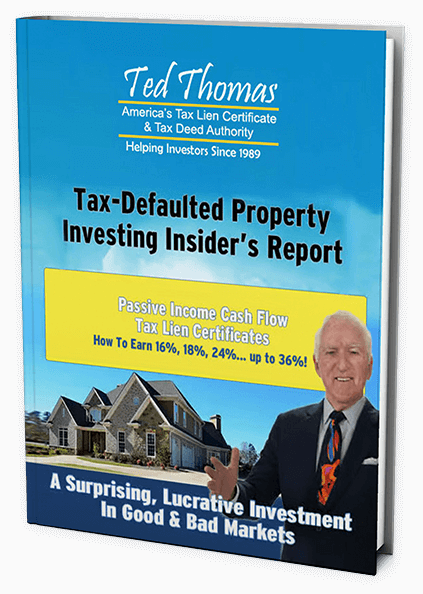This article will teach you more about:
- The rules of Pennsylvania in its tax deed sales
- The different types of tax deed sales in Pennsylvania
- The difference between the rules of East and West Pennsylvania in tax deed sales
Table of Contents
- Pennsylvania’s Unique Tax Deed Sale Process
- What is a Tax Deed?
- The Tax Delinquent Property Process in Tax Deed States
- County Auction Rules in East & West Pennsylvania
- The 4 Types of Tax Sales in Pennsylvania
- Conclusion
Pennsylvania’s Unique Tax Deed Sale Process
Pennsylvania considers itself a commonwealth. I’m not a student of the different governments, so I don’t know the difference between the commonwealth and the state. However, I do know it’s a legal enterprise, and as entrepreneurs and investors, you need to be aware of the tax auction rules and unique process. Today I’m answering your question, Is Pennsylvania a tax lien or deed state? For the last 30 years I’ve been guiding newcomers and experienced investors through the learning process of tax liens and tax deeds. This is a business of abundance, and you’ll quickly realize there is opportunity to grow financially once you know how it works. Pennsylvania is a tax deed state that has 67 counties, and I want to mention that Pittsburgh, Philadelphia, and Scranton and Allegheny County all have special auctions and special descriptions and provisions. For example, each of those districts I mentioned will have the following sales:- Upset sale
- Private sale
- Judicial sale
- Repository sale
What is a Tax Deed?
Here’s a brief explanation of tax deeds. It starts with the state legislature and the lawmakers.
The collection of property taxes is always a challenge. Simply stated, decades ago, the state legislature in coordination with the counties, created the process of how a county will handle tax-defaulted property owners. This process was all created before income taxes.
The legislature made the rules and authorized the counties to levy taxes, followed by the collection of taxes.
If the tax was uncollectible, the legislature mandated the county treasurer to confiscate the property. That means they will seize it and evict anyone on the property. Then they will auction the property at a public auction to the highest bidder and use the revenue to pay the back taxes.

It’s typical for the bidding to begin at the back taxes, which means that you can purchase real estate at tax deed auctions for pennies on the dollar.
The Tax Delinquent Property Process in Tax Deed States
So Pennsylvania is a tax deed state. The process in Pennsylvania is outlined in the statutes, and it is somewhat convoluted. However, there is a large bureaucracy in each county to administer the process.
Pennsylvania is one of the original states of the Union, and the rules were developed and executed over hundreds of years.
Keep in mind, the county government needs money to pay employees and for schools to pay teachers, to fix the roads, police department, and all its equipment requires money.
The property owner has a limited amount of time to pay. If they don’t pay on time, the sheriff for the court will take action and deliver default notice, and the property will be sold at the auction.
This is typical of all tax defaulted auctions in deed states.
It’s a privilege to own property in the United States. The owner of the property is allowed to do many things with the property. For example, the property owner can rent, subdivide the property, sell the property, raise crops on the property, raise cattle on the property, and build houses and barns, however, they must pay property taxes.
County Auction Rules in East & West Pennsylvania
Repeating what I said earlier, the western section of Pennsylvania will have different rules than the eastern part of the state.
That doesn’t mean anything is wrong; it just means the governments do things differently. There is nothing wrong with the county creating their two provisions that only apply within the county.
It’s up to you, the property purchaser, the entrepreneur to learn the rules.
Questions can be asked of the sheriff, the treasurer, and the county attorney. Accurate information will always be in the statutes.
The 4 Types of Tax Sales in Pennsylvania
How does a tax sale work in Pennsylvania? Each county in each state may have additional rules and processes, and each county is responsible for conducting its own auctions.
The process could include:
Upset sale – This sale occurs after 2 years of a property owner not paying tax. I wouldn’t get too excited about an upset sale because if you buy at this sale, you’re going to pay all the back liens.
In other words, you have to pay the mortgage and any other liens or judgments, anything that’s on the property. So a lot of investors wait a little while for the judicial sale.
Private Sale – The second sale could be called a private sale. This auction again is different from the upset sale and will be subject to any judgments or liens. In other words, the title is not clear.
Judicial Sale – The sale you probably want is the judicial sale. Does a tax sale wipe out a mortgage in PA? Yes, there is no mortgage, and there are no liens for the back taxes. So this particular sale is called the free and clear sale.
Repository Sale – lastly, there is a repository sale. These properties are leftovers that didn’t sell at the upset sale or judicial sale, so they go on the Repository List.
Conclusion
In today’s lesson, “Is Pennsylvania a Tax Lien or Deed State?” Ted explains that Pennsylvania is a tax deed state with a unique process.
Not only are there differences between the way things are done in east and west Pennsylvania, but there are also four different types of sales, the Upset Sale, Private Sale, Judicial Sale, and Repository Sale.
It’s important to know the rules of the different sales to avoid getting a title with encumbrances.
For example, the Upset Sale or Private Sale could leave you with a title that’s not clear.
It’s at the Judicial Sale where you can pick up a property with no mortgage and no liens, and the Repository Sale would be the leftovers that didn’t sell at the Upset Sale or Judicial Sale.
Investors need to understand the rules, which can vary from county to county.
If you’d like to learn more about tax lien and tax deed investing , Ted Thomas offers full support and a complete training with home study courses, Q&A sessions, live tutorials, workshops & web classes, and personal one-on-one coaching.
Want to learn more about how to create wealth from bargain real estate? Get the insider info from Ted Thomas. Start today with this FREE Gift that reveals the secrets of tax lien certificates and tax deeds.




